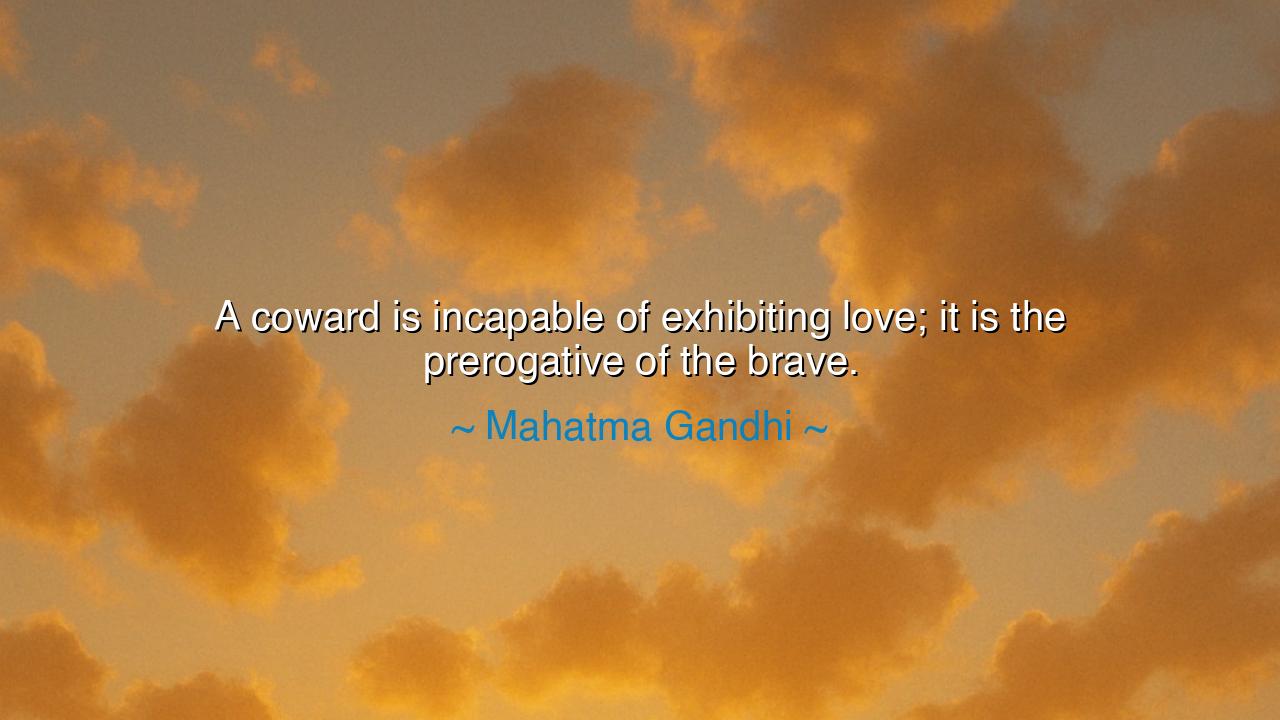
A coward is incapable of exhibiting love; it is the prerogative






"A coward is incapable of exhibiting love; it is the prerogative of the brave." Thus spoke Mahatma Gandhi, the apostle of peace, the warrior of the spirit, whose strength was not of sword or shield but of heart and faith. In these few words, he unveiled a truth that pierces through the illusions of human weakness: that love is not softness, not submission, but the highest expression of courage. The coward hides behind fear, pride, and hate; but the brave, standing unarmed before injustice, still chooses to love. To love, then, is not to retreat—it is to advance toward the light, even when the world is cloaked in darkness.
The origin of this wisdom lies deep in Gandhi’s philosophy of ahimsa, or nonviolence—a principle not of passivity, but of strength rooted in compassion. Gandhi had seen how men mistake hatred for power, how they raise their hands in anger because they are too weak to forgive. For him, the true hero was not the soldier who killed, but the man who, though wronged, refused to surrender his love. Love, he taught, is an act of supreme courage, for it demands that one overcome the fiercest of enemies: fear. Only the brave can love, because only the brave can look upon suffering and still say, “I will not repay evil with evil.”
To exhibit love, one must stand exposed, without armor or advantage, trusting in the unseen strength of the soul. This is the courage of the mother who shields her child with her body; of the reformer who speaks truth to tyranny; of the friend who forgives betrayal. The coward seeks to protect himself, but in doing so, he imprisons his heart. The brave one gives himself freely, and in that giving, he conquers both fear and hatred. Gandhi believed that love is not weakness—it is the highest form of power, for it has the strength to transform the oppressor as well as the oppressed.
Consider the story of Gandhi himself, standing before the might of the British Empire. He possessed no army, no wealth, no weapons—only faith in the power of love. When struck, he did not strike back; when imprisoned, he prayed for his jailers. The world called him frail, yet empires trembled before his truth. His strength came not from anger, but from fearlessness; and his fearlessness was born of love—for his people, for justice, for humanity. Only the brave could stand as he did: loving even those who sought to destroy him. Through his courage, India found freedom, and the world found a new measure of strength.
In this light, Gandhi’s words also reveal a great paradox: it takes more courage to forgive than to fight. Violence is easy—it is the reaction of fear and anger—but to love in the face of hate, to remain gentle amid cruelty, requires a soul tempered in fire. The coward, afraid of pain or humiliation, closes his heart; the brave, unafraid of suffering, opens his heart wider. True love asks of us not comfort, but sacrifice—the willingness to endure for the sake of another’s good. Only those who have faced their own weakness can love without condition.
The lesson is clear: if we wish to love deeply, we must first learn to be brave. We must confront the fears that make us selfish—the fear of rejection, of vulnerability, of loss—and let them burn away. To love your neighbor, your family, or your enemy, you must possess a strength that does not yield to pride. When you choose to forgive, when you choose compassion over vengeance, you are not surrendering—you are conquering the very forces that enslave mankind. Love is the victory of the fearless heart.
So, my listener, remember this ancient truth: cowardice breeds hate, but courage gives birth to love. Do not shrink from the pain of love—it is the forge of greatness. Stand firm in kindness even when others mock you; forgive even when you are wounded; offer your hand when others raise their fists. For every act of love is an act of bravery, and every brave heart is a spark of divine light in a world too often ruled by fear.
And thus, the teaching of Mahatma Gandhi endures like a flame that no wind can extinguish: to love is to be strong, to forgive is to be free, and to live with compassion is to stand among the bravest of all. Let your love, then, be fearless. For only the brave can heal the world.






AAdministratorAdministrator
Welcome, honored guests. Please leave a comment, we will respond soon